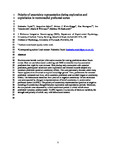Polarity of uncertainty representation during exploration and exploitation in ventromedial prefrontal cortex
| dc.contributor.author | Trudel, N | |
| dc.contributor.author | Scholl, J | |
| dc.contributor.author | Klein-Flügge, MC | |
| dc.contributor.author | Fouragnan, Elsa | |
| dc.contributor.author | Tankelevitch, L | |
| dc.contributor.author | Wittmann, MK | |
| dc.contributor.author | Rushworth, MFS | |
| dc.date.accessioned | 2020-09-01T14:59:08Z | |
| dc.date.available | 2020-09-01T14:59:08Z | |
| dc.date.issued | 2020-08-31 | |
| dc.identifier.issn | 2397-3374 | |
| dc.identifier.issn | 2397-3374 | |
| dc.identifier.other | 0 | |
| dc.identifier.uri | http://hdl.handle.net/10026.1/16207 | |
| dc.description.abstract |
Environments furnish multiple information sources for making predictions about future events. Here we use behavioural modelling and functional magnetic resonance imaging to describe how humans select predictors that might be most relevant. First, during early encounters with potential predictors, participants' selections were explorative and directed towards subjectively uncertain predictors (positive uncertainty effect). This was particularly the case when many future opportunities remained to exploit knowledge gained. Then, preferences for accurate predictors increased over time, while uncertain predictors were avoided (negative uncertainty effect). The behavioural transition from positive to negative uncertainty-driven selections was accompanied by changes in the representations of belief uncertainty in ventromedial prefrontal cortex (vmPFC). The polarity of uncertainty representations (positive or negative encoding of uncertainty) changed between exploration and exploitation periods. Moreover, the two periods were separated by a third transitional period in which beliefs about predictors' accuracy predominated. The vmPFC signals a multiplicity of decision variables, the strength and polarity of which vary with behavioural context. | |
| dc.format.extent | 83-98 | |
| dc.format.medium | Print-Electronic | |
| dc.language | en | |
| dc.language.iso | en | |
| dc.publisher | Springer Science and Business Media LLC | |
| dc.rights | Attribution-NonCommercial-NoDerivatives 4.0 International | |
| dc.rights | Attribution-NonCommercial-NoDerivatives 4.0 International | |
| dc.rights | Attribution-NonCommercial-NoDerivatives 4.0 International | |
| dc.rights | Attribution-NonCommercial-NoDerivatives 4.0 International | |
| dc.rights | Attribution-NonCommercial-NoDerivatives 4.0 International | |
| dc.rights | Attribution-NonCommercial-NoDerivatives 4.0 International | |
| dc.rights | Attribution-NonCommercial-NoDerivatives 4.0 International | |
| dc.rights | Attribution-NonCommercial-NoDerivatives 4.0 International | |
| dc.rights.uri | http://creativecommons.org/licenses/by-nc-nd/4.0/ | |
| dc.rights.uri | http://creativecommons.org/licenses/by-nc-nd/4.0/ | |
| dc.rights.uri | http://creativecommons.org/licenses/by-nc-nd/4.0/ | |
| dc.rights.uri | http://creativecommons.org/licenses/by-nc-nd/4.0/ | |
| dc.rights.uri | http://creativecommons.org/licenses/by-nc-nd/4.0/ | |
| dc.rights.uri | http://creativecommons.org/licenses/by-nc-nd/4.0/ | |
| dc.rights.uri | http://creativecommons.org/licenses/by-nc-nd/4.0/ | |
| dc.rights.uri | http://creativecommons.org/licenses/by-nc-nd/4.0/ | |
| dc.subject | Bayes Theorem | |
| dc.subject | Brain | |
| dc.subject | Choice Behavior | |
| dc.subject | Exploratory Behavior | |
| dc.subject | Female | |
| dc.subject | Functional Neuroimaging | |
| dc.subject | Humans | |
| dc.subject | Judgment | |
| dc.subject | Magnetic Resonance Imaging | |
| dc.subject | Male | |
| dc.subject | Prefrontal Cortex | |
| dc.subject | Uncertainty | |
| dc.subject | Young Adult | |
| dc.title | Polarity of uncertainty representation during exploration and exploitation in ventromedial prefrontal cortex | |
| dc.type | journal-article | |
| dc.type | Journal Article | |
| dc.type | Research Support, Non-U.S. Gov't | |
| plymouth.author-url | https://www.webofscience.com/api/gateway?GWVersion=2&SrcApp=PARTNER_APP&SrcAuth=LinksAMR&KeyUT=WOS:000564508000003&DestLinkType=FullRecord&DestApp=ALL_WOS&UsrCustomerID=11bb513d99f797142bcfeffcc58ea008 | |
| plymouth.issue | 1 | |
| plymouth.volume | 5 | |
| plymouth.publication-status | Published online | |
| plymouth.journal | Nature Human Behaviour | |
| dc.identifier.doi | 10.1038/s41562-020-0929-3 | |
| plymouth.organisational-group | /Plymouth | |
| plymouth.organisational-group | /Plymouth/Faculty of Health | |
| plymouth.organisational-group | /Plymouth/Faculty of Health/School of Psychology | |
| plymouth.organisational-group | /Plymouth/REF 2021 Researchers by UoA | |
| plymouth.organisational-group | /Plymouth/REF 2021 Researchers by UoA/UoA04 Psychology, Psychiatry and Neuroscience | |
| plymouth.organisational-group | /Plymouth/Users by role | |
| plymouth.organisational-group | /Plymouth/Users by role/Academics | |
| plymouth.organisational-group | /Plymouth/Users by role/Researchers in ResearchFish submission | |
| dc.publisher.place | England | |
| dcterms.dateAccepted | 2020-07-17 | |
| dc.rights.embargodate | 2021-2-28 | |
| dc.identifier.eissn | 2397-3374 | |
| dc.rights.embargoperiod | Not known | |
| rioxxterms.versionofrecord | 10.1038/s41562-020-0929-3 | |
| rioxxterms.licenseref.uri | http://creativecommons.org/licenses/by-nc-nd/4.0/ | |
| rioxxterms.licenseref.startdate | 2020-08-31 | |
| rioxxterms.type | Journal Article/Review |



